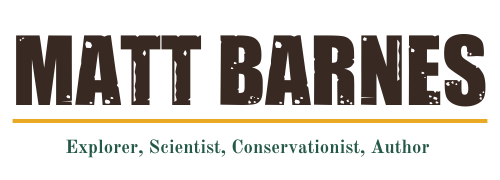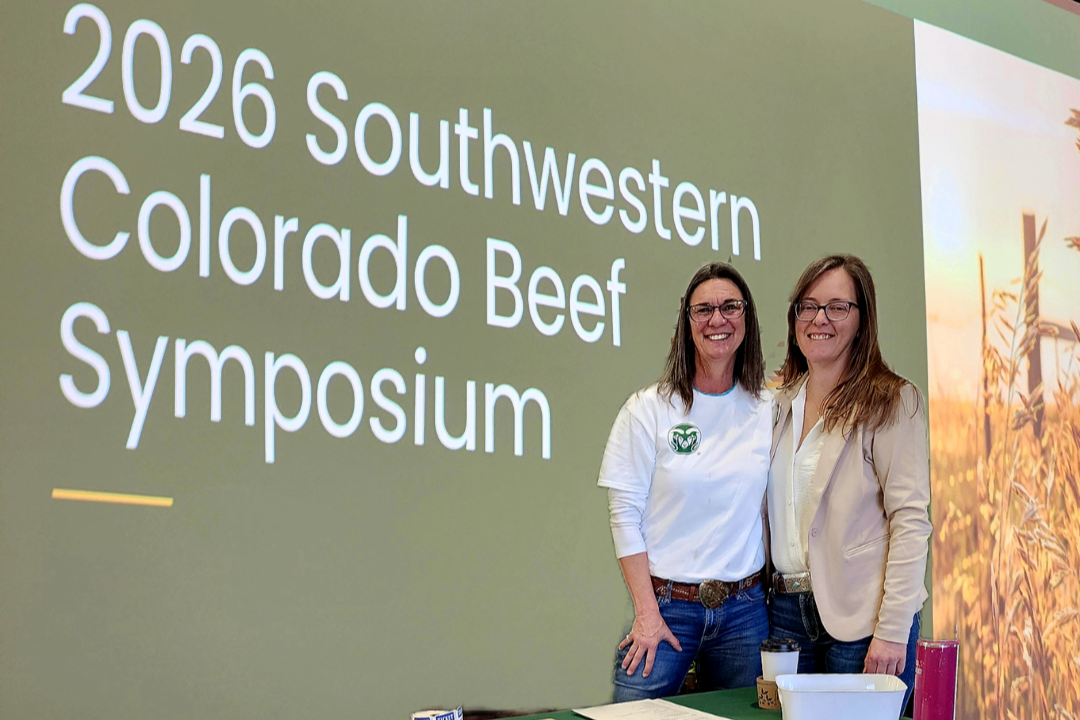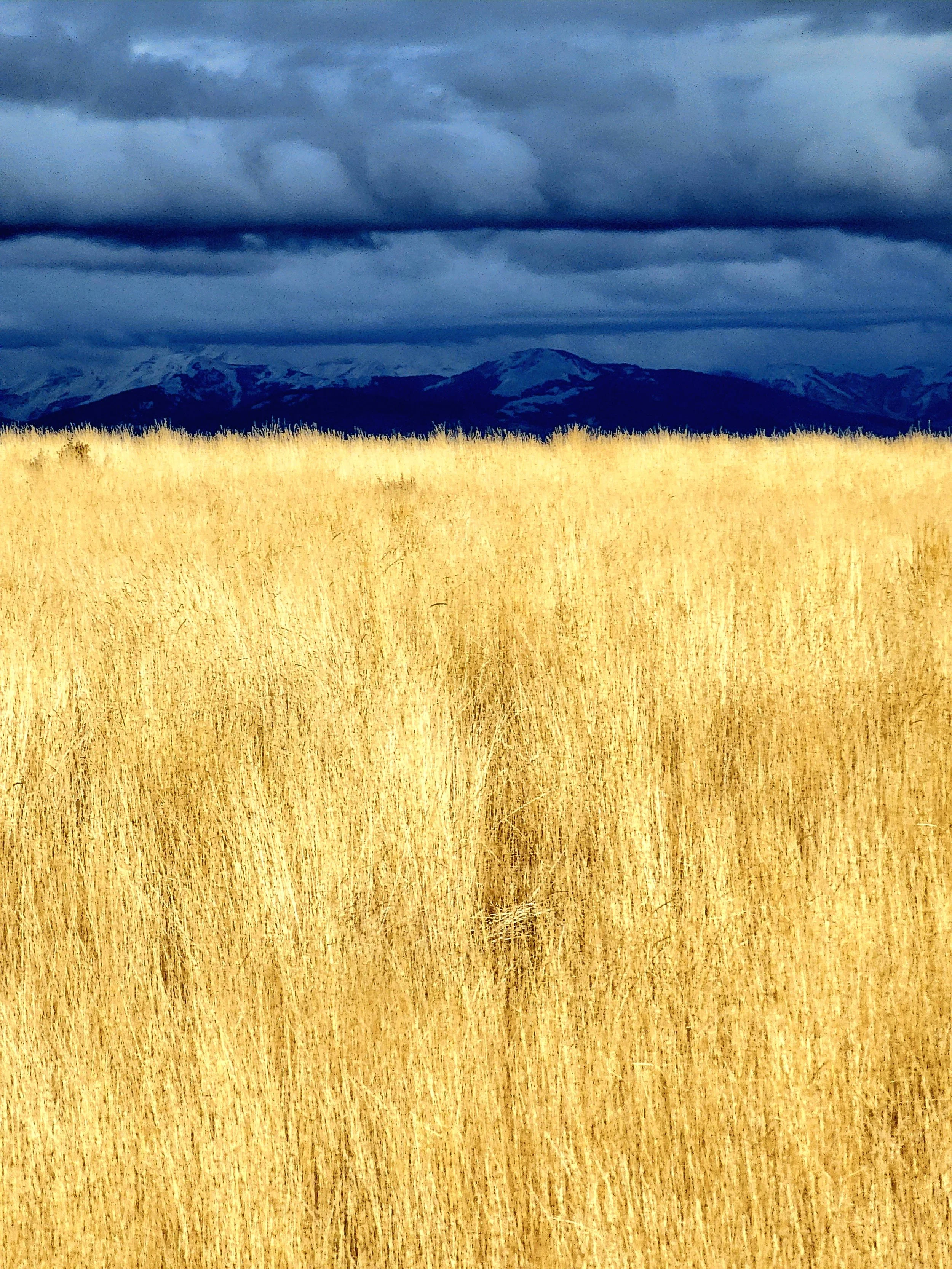
FIELD NOTES
Land and life at the confluence of Earth and Sky
Southwestern Colorado Beef Symposium highlights forages, climate change
The Southwestern Colorado Beef Cattle Symposium, hosted by Colorado State University Extension - Montezuma County, covered economics of the cattle and hay markets, best practices for calving, management of forages, tools for tracking and predicting the weather, and an update from the USDA Farm Service Agency. I especially enjoyed the talk on forage management by retired forage specialist Dr. Joe Brummer, who I’ve known for twenty years.
I also enjoyed the talk on using weather information for management decisions, by a freshly minted PhD in atmospheric science.
The Colorado Parks and Wildlife Commission unanimously adopted the resolution supporting federal public lands
Today, the Colorado Parks and Wildlife Commission unanimously passed a resolution “Concerning the Protection of National Public Lands In Colorado” (Resolution 2025-02), which are essential for wildlife habitat, outdoor recreation including hunting and fishing, and many other uses. And by extension, the resolution supports the federal employees in the agencies that manage those lands in the Department of the Interior and the Department of Agriculture. This is especially pertinent to the most threatened public lands, which are the multiple-use lands held by the Bureau of Land Management and the US Forest Service.
Conservation and health of public lands shouldn't be controversial
Our public lands, the health of those lands, and our access to them are the foundation of our western way of life.
The Bureau of Land Management’s 2024 Public Lands Rule on Conservation and Landscape Health, now proposed for rescission, is a small, important, and oddly controversial step in implementing the agency’s mission under the Federal Land Policy and Management Act of 1976 (FLPMA), which as the BLM’s organic act effectively mandated conservation in terms of multiple use and sustained yield nearly half a century ago. FLPMA required public lands to meet the “present and future needs of the American people,” and mandated management to prevent “permanent impairment of the productivity of the land and the quality of the environment.”
Defend the Roadless Rule, Protect Your National Forests
As a rangeland scientist, I know firsthand that roads are damaging to forests and watersheds, and that the 2001 Roadless Rule protects more of the backcountry of our national forests than any other federal regulation.… Wild animals need areas far from people and vehicles, especially threatened species like the grizzly bear in the Northern Rockies... I recently paddled through the largest roadless area in the contiguous US, and I know that multi-day river trips away from roads and vehicles are essential and life-changing experiences.
Never forget that we are stronger as a Union
Twenty-four years ago, on September 11, one of the formative events of our generation, at least 2,977 people, including 343 firefighters and 72 law enforcement officers, lost their lives amid a horrific act of ethnocentric violence perpetrated under a banner of patriotism and religion. We, fellow Americans and friends around the world, highly resolve that they shall not have died in vain...
Colorado Public Lands Day Prescribed Fire Celebration
For Colorado Public Lands Day, the third Saturday in May, I joined the educational Prescribed Fire Celebration, hosted by the San Juan National Foreston the Dolores Ranger District, along with the Dolores Watersheds Collaborative, Fire Adapted Colorado, Wildfire Adapted Partnership, Mountain Studies Institute, San Juan Mountains Association, and CSU Extension - Montezuma County. We even had grass-fed burgers for lunch, thanks to Cachuma Ranch, a Dolores District permittee.
Flathead Wild & Scenic River plan should focus on wildlife and wild character
When John and Frank Craighead and friends floated the majestic Flathead nearly seven decades ago, their experience on the remote and rarely traveled river inspired the Wild and Scenic Rivers Act. As with most land, water, and wildlife issues, protections began with recreationists who could see beyond their own interests. We protect what we love, and we love what we know and experience most deeply.
Today, the Craigheads would recognize the upper sections of the forks of the Flathead, which still retain that character as the quintessential wild and scenic rivers, but might not recognize the lower sections, which are now heavily used.
Wolf-livestock conflict minimization workshops with Colorado agriculture and wildlife agencies
I attended the wolf-livestock conflict minimization workshop in Gypsum, one of several hosted by agriculture and wildlife agencies in western Colorado this fall. The agencies have been busy building out conflict minimization programs, which collectively might be the most robust program of any western state with wolves.
Virtual fence technology improves grazing management on public lands
A couple dozen ranchers, virtual fence company employees, and agency rangeland specialists from the U.S. Forest Service and the Bureau of Land Management, as well as from the Natural Resources Conservation Service and Colorado State University Extension, gathered on a brisk fall morning to learn about virtual fence, which might be the most significant technological innovation for improving grazing management on the range in the last century. We travelled through ponderosa pine, Gambel oak, and grass meadows to see how it is being used on a grazing allotment on the San Juan National Forest.
Whatever we call it, let’s protect the Dolores
Welcome, Senators Bennet and Hickenlooper, to the last best part of Colorado.
I'm a rangeland scientist and conservationist. I used to manage a ranch in Montrose and Gunnison Counties. Now I live in southwest Colorado, almost on the bank of the Dolores River.
The Wyoming Game and Fish Commission and state Legislature should revisit the “predator zone,” address animal welfare and increase transparency
I testified to the Wyoming Game and Fish Commission, in the wake of the incident in which a man ran over a wolf and showed off the dying animal at the Green River Bar in Sublette Co.—and was cited only for possessing the animal while it was still alive (a mere $250 fine), and the Commission’s statement in response to the public outcry. Along with nearly fifty other conservationists (given two minutes apiece), I spoke about how the Commission should work with the state Legislature to revisit the Predatory Animal Management Area or “predator zone,” extend animal cruelty laws to wildlife, and increase transparency.
Monitoring grass growth on the Great Sage Plain
The Great Sage Plain, a broad grassy ridge that divides the canyons of the Dolores and San Juan watersheds, on the eastern Colorado Plateau in view of the San Juan Mountains, was farmed during the 1200s and again in the 1900s. This spot is now perennial pasture…
Colorado “Born to be Wild” license plate to fund wolf coexistence signed into law
The Colorado "Born to be Wild" license plate (HB23-1265) was signed into law by Gov. Polis May 20 on the bank of the Colorado River in Glenwood Springs, near where wolves are planned to be released in 2023-2025. The new plate is a mechanism for resources to flow uphill and away from money, so to speak—from supporters of wolf restoration to Colorado Parks and Wildlife, and ultimately to the ranchers and rural communities who will be living with wolves.
Colorado Wolf Restoration and Management Plan approved by CPW
The Colorado Parks and Wildlife Commission unanimously approved the Colorado Wolf Restoration and Management Plan on May 3. The plan was developed by CPW with input from a Technical Working Group, comprised mostly of agency personnel from other states with wolves; and a Stakeholder Advisory Group, comprised of ranchers, outfitters, hunters, and wildlife advocates. It is likely that the plan will be revised in a few to several years.
Colorado wolf plan released, hearings scheduled, comments sought
Colorado Parks and Wildlife released the first draft of the Colorado Wolf Restoration and Management Plan on Dec. 9. The plan includes reintroduction logistics, recovery criteria, and a framework for management of impacts (positive and negative), including livestock conflict prevention and compensation. The plan was expected to reflect the recommendations of the Technical Working Group (agency representatives and experts from the Northern Rockies) and the Stakeholder Advisory Group (ranchers, hunters, outfitters, and wildlife conservationists), both of which recently concluded deliberations after meeting monthly for the last year and a half along with agency staff and a third-party facilitator.
Support Indigenous Peoples’ Day, and all people’s indigeneity
Today is Indigenous Peoples’ Day. While it is meant to honor Native Americans especially, it also honors indigenous peoples everywhere, and – most importantly – the indigeneity in all of us.
The world’s long and bloody history of conquest continues mostly in more subtle ways, wherever one culture sees its way as the one true way. Yet at this very moment, we have one nation-state invading another, committing blatant ethnic cleansing of a tribal culture in the name of safety and security. It’s long past time to leave all that behind, heal the wounds of the past and find ways to build a better future.
Low-stress herding as a coexistence strategy
Here’s a short film, produced by People and Carnivores about a range rider practicing low-stress herding, as part of their library of short films about coexistence tools. In this case, I worked with the range rider on part of the largest grazing allotment in the West, in the Wind River Range of Wyoming, where there are lots of grizzlies and wolves and more than a few dead cattle…. So the permittees agreed to try herding in one pasture system.
Comment in support of Indigenous Peoples’ Day in Montana
I traveled to the Montana state capitol with my friend Marsha Small (Northern Cheyenne, with the Native American Studies department at Montana State University) and a group from Indigenous Peoples Day Montana to testify in support of designating Indigenous Peoples’ Day on the day more commonly known as Columbus Day. Thanks to the folks at Indigenous Peoples’ Day Montana, Indigenous Peoples’ Day is already celebrated at Montana State University and in Bozeman, but not yet statewide.
Excellence in Rangeland Management Award presented to Whit Hibbard
I just had the honor of presenting the Excellence in Rangeland Management Award to my friend and collaborator, Whit Hibbard, at the annual meeting of the International Mountain Section of the Society for Range Management. The annual award goes to someone who is directly involved in managing land in western Montana or Alberta, and who has made a significant contribution to the sustainability of rangelands. Traditionally it goes to a rancher, but not necessarily.
Strategic grazing management using low-stress herding and night penning for animal impact
In this project, Whit Hibbard and I—a rancher and a conservationist—applied low-stress approaches to herding and night-penning cattle at relatively high stocking density (SD) within a rangeland pasture in a larger grazing rotation.




















